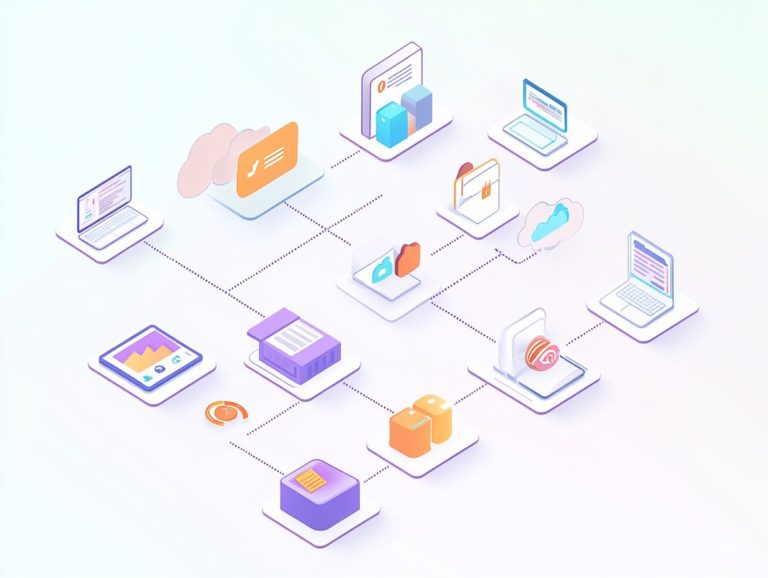Post-Implementation: Maintaining Your CRM
In today’s fast-paced business landscape, maintaining a robust Customer Relationship Management (CRM) system is essential for your long-term success.
However, simply putting a CRM in place is just the start; ongoing maintenance is vital to maximize its benefits and ensure a solid return on your investment.
This article delves into best practices for post-implementation maintenance, highlighting the significance of regular data clean-up, user training, and effective tools to keep your CRM operating seamlessly. Let s tackle common challenges head-on and discover strategies to measure your success effectively!
Explore how diligent CRM upkeep can transform your business into a powerhouse of efficiency and growth.
Contents
- Key Takeaways:
- The Importance of Maintaining Your CRM
- Best Practices for Post-Implementation Maintenance
- Common Challenges in CRM Maintenance
- Tools and Strategies for Maintaining Your CRM
- Measuring Success in Maintaining Your CRM
- Frequently Asked Questions
- What is post-implementation and why is it important for maintaining a CRM?
- What are some key tasks involved in maintaining a CRM post-implementation?
- How often should a business perform maintenance on their CRM post-implementation?
- What are some common challenges businesses face when maintaining their CRM post-implementation?
- How can businesses ensure the security of their CRM data during post-implementation maintenance?
- What are the benefits of maintaining a CRM post-implementation?
Key Takeaways:

Regular maintenance of your CRM is crucial for long-term success and ROI. Key practices include data clean-up and user training and support. Challenges can be addressed with proper identification and third-party support services.
The Importance of Maintaining Your CRM
Maintaining your CRM system is essential for securing long-term business success and driving big improvements in managing customer relationships. A well-kept CRM not only bolsters sales growth by improving data integrity and encouraging user adoption, but it also promotes seamless collaboration among teams across various departments. This ultimately results in enhanced stakeholder engagement.
Different types of CRM, such as operational, analytical, and collaborative, help you understand and meet your unique business needs.
Long-Term Benefits and ROI
Investing in CRM maintenance offers remarkable long-term benefits and a solid return on investment (ROI), making a significant impact on your sales growth and customer support.
By keeping your CRM systems up to date, you can achieve enhanced data management, which in turn fosters more well-considered choices.
For instance, a recent study found that organizations utilizing CRM software see an average sales revenue increase of 46%, clearly illustrating how effective data management translates into tangible financial gains.
Diligent maintenance naturally leads to enhanced customer support; when your teams are equipped with accurate information, they can respond to customer inquiries more quickly and effectively, resulting in higher satisfaction rates.
Choosing the right CRM vendor is essential, as it not only influences immediate performance but also lays the foundation for sustainable growth. Companies that invest in the right CRM partners often report a 30% boost in operational efficiency, highlighting the importance of strategic vendor selection.
Best Practices for Post-Implementation Maintenance
Implementing a CRM system marks the beginning of a transformative journey. It’s crucial to follow best practices, including preparing for CRM software upgrades, for post-implementation maintenance to truly unlock its potential and elevate user experience.
Regular Data Clean-Up and Updates
Regular data clean-up and updates are essential for you to maintain data integrity within your CRM, ensuring that your customer data management remains accurate and reliable.
This ongoing process does more than just eliminate duplicates and outdated information; it gives you the power to unlock the true potential of your data.
By leveraging tools like data profiling software and automated cleansing programs, you can streamline your data management efforts effortlessly.
Implementing strategies such as regular audits and user training cultivates a culture of data accuracy within your organization.
Clean data enhances your customer interactions, enabling personalized communication and targeted marketing strategies that ultimately lead to better outcomes and increased customer loyalty.
Training and Support for Users

Providing adequate training and support for users is crucial. It helps users get on board and improves your overall CRM experience.
Various training methods can help, such as interactive workshops and easy-to-follow online guides.
Support mechanisms like dedicated help desks and chatbots assist when challenges arise.
Encouraging user feedback refines your training and adapts customer support to meet evolving needs.
Use insights from user experiences to continuously improve your CRM systems and support mechanisms.
Common Challenges in CRM Maintenance
Despite CRM systems’ advantages, organizations face common maintenance challenges. Ensuring user adoption while maintaining data integrity can be tough.
Identifying and Addressing Issues
Quickly identifying and addressing issues is vital for effective CRM maintenance. This proactive approach helps prevent larger data management problems.
Use user feedback tools, like surveys, to gather insights on experiences and pain points.
Engaging with users helps pinpoint areas needing improvement.
Training sessions empower users with skills to fully leverage CRM features.
Addressing concerns boosts user satisfaction, productivity, and data integrity, allowing teams to work efficiently.
Tools and Strategies for Maintaining Your CRM
Using the right tools and strategies can streamline your CRM management. These approaches elevate your performance monitoring.
Automation and Integration
Incorporating automation and software integration into your CRM can revolutionize data handling. This transformation enables you to automate repetitive tasks, freeing your teams to focus on strategic growth initiatives.
Marketing automation platforms like HubSpot and Marketo enhance lead tracking. They help your sales teams prioritize prospects based on engagement metrics.
Integrating these tools into your CRM logs and analyzes customer interactions in real time. This integration provides better insights into customer behavior and preferences, leading to more personalized outreach and higher conversion rates.
Third-Party Support Services

Utilizing third-party support services enhances your CRM’s capabilities. These services provide essential customer support for system maintenance.
They offer specialized training sessions, ongoing technical assistance, and tailored consulting. This expert knowledge ensures your CRM system reaches its full potential.
Proactive monitoring and troubleshooting help address issues before they escalate, protecting your system’s integrity.
Regarding user training, these services deliver customized programs that meet your workforce’s unique needs. Empower your employees with skills to maximize productivity.
Measuring Success in Maintaining Your CRM
Measuring CRM maintenance success is crucial for understanding its impact on sales data. This knowledge helps you make informed decisions that enhance strategies and drive results.
KPIs and Metrics to Track
Tracking KPIs and metrics helps you analyze your CRM’s performance and discover valuable sales insights. By focusing on important measures like customer acquisition cost, customer lifetime value, and churn rate, you gain a clearer understanding of your sales dynamics.
Metrics such as response time to customer inquiries and average resolution time can highlight areas for improvement in your support efforts. These insights reveal trends over time and help pinpoint strengths and weaknesses in your support strategies.
With this information, you can tailor customer interactions to meet evolving needs, ultimately enhancing overall satisfaction.
Frequently Asked Questions
What is post-implementation and why is it important for maintaining a CRM?
Post-implementation is the time after setting up and launching a CRM system. This period is crucial as it allows businesses to ensure their CRM functions properly and meets their needs, while also making necessary updates and adjustments.
What are some key tasks involved in maintaining a CRM post-implementation?

Key tasks include regularly monitoring data accuracy and updating contact and account information. It’s also vital to follow up on customer interactions and implement necessary software updates or bug fixes.
How often should a business perform maintenance on their CRM post-implementation?
It is recommended to perform maintenance on a CRM system at least once a month to ensure data accuracy and system functionality. However, the frequency may vary depending on the system’s size, complexity, and specific business needs.
What are some common challenges businesses face when maintaining their CRM post-implementation?
Common challenges include data entry errors and user adoption issues. These can hinder your CRM’s effectiveness, along with system integrations and keeping up with updates in CRM technology. Having a solid plan and dedicated resources is essential to address these challenges.
How can businesses ensure the security of their CRM data during post-implementation maintenance?
Businesses should regularly back up their CRM data, implement secure login processes, and regularly review and update security protocols. It’s also important to have a disaster recovery plan in case of data breaches or loss.
What are the benefits of maintaining a CRM post-implementation?
Maintaining your CRM helps ensure data accuracy and strengthens customer relationships. It also maximizes your investment in the system and boosts overall efficiency and productivity.






